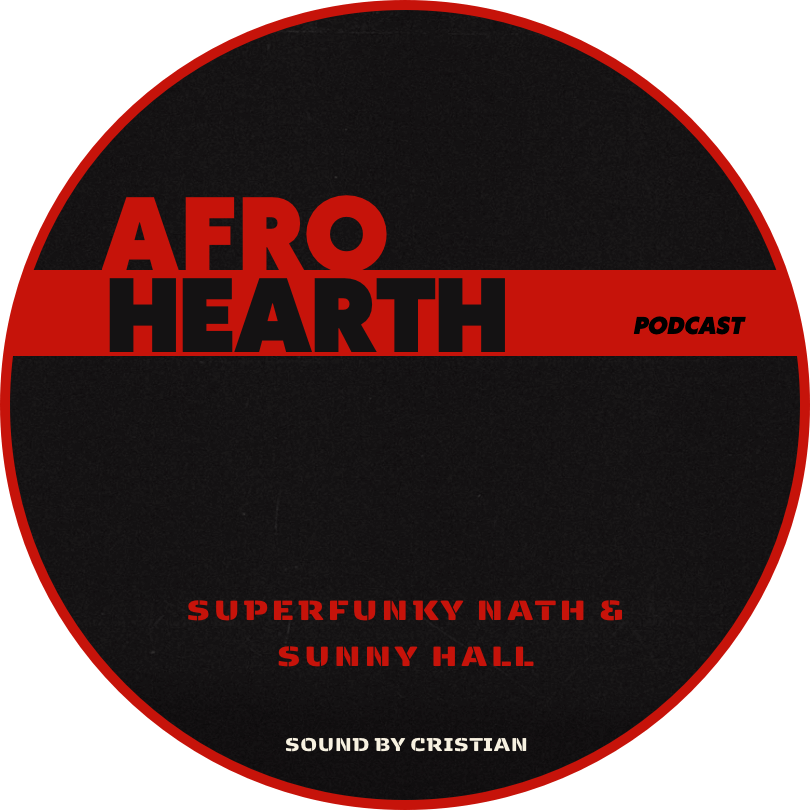
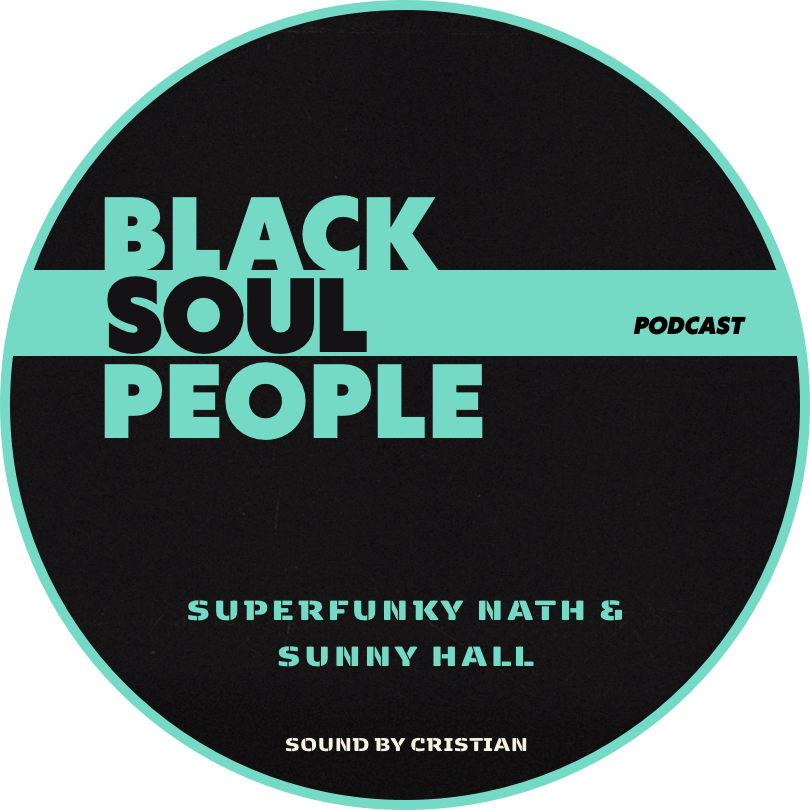
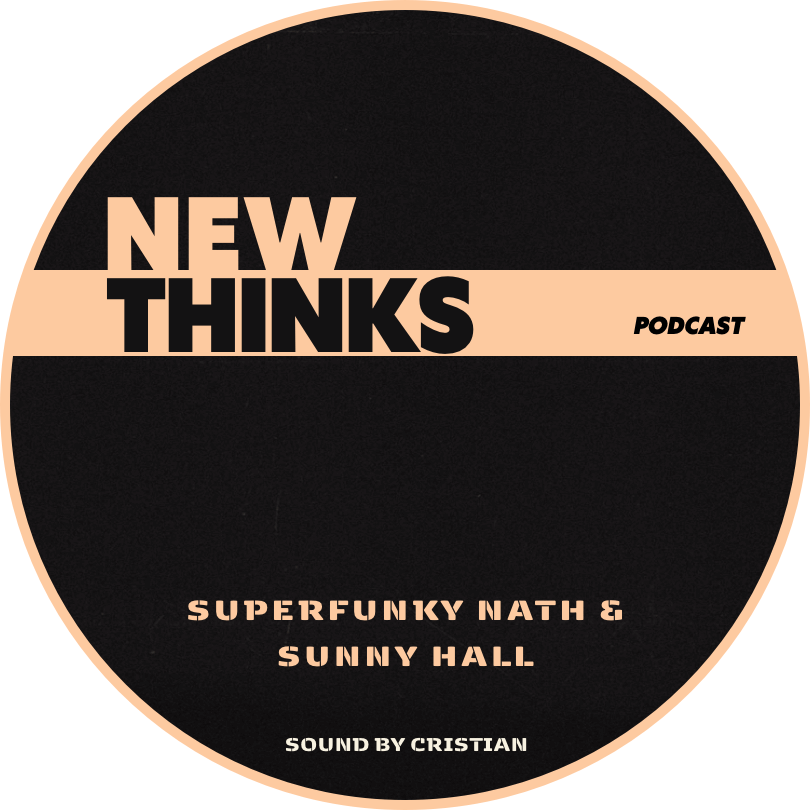
I think, I have more than one universe.
The first one would be, starting with my origins from Equatorial Guinea.
My parents were from there, they came to Spain being teenagers to further their studies. At that time, on both sides it was the same education level and system, because Equatorial Guinea was like another Spanish province.
When the coup d’etat occurred in their homeland in 1968, they stayed here in Spain, my mother was fifteen and my father seventeen when they arrived to settle in the province of Madrid, they were fighters and hard-working.
My father continued with his studies and his social ascension, becoming manager of a local company which led him to a better financial situation in comparison with the rest of his small Guinean community.
Evolving between both worlds with dexterity converted him in a type of counsellor or reference for others.
They married and their house was opened to the rest of relatives, who usually were newcomers, they helped them in their beginnings.
The Guineans were few but could enjoy secured standard jobs as lawyers for example, thanks, also to their Spanish nationality. It would be very unlikely today in the current context.
Despite, the dictator Francisco Masías Nguema and the first independence,
they could live and work, start a new life, even though at some point, they had been left without nationality or papers, they were neither Guineans nor Spaniards, but the situation did not stop them from living or working or starting their new life and it has nothing to do with what is happening now in this country, when you need papers for absolutely everything. Going back to the story, with time, they were able to obtain the Spanish nationality.
I lived in this environment being a very spoiled child, very protected. Looking back it was a privilege to see so many people pass by, so many movements,
so many experiences.
My father has left to my brother and I, a great legacy from that era with a considerable archive in images, thanks to his passion for photography.
He also had this habit of making carbon copies of his letters in which you could observe the dynamics of relations between those who were here and those who were there.
This first generation of Guineans had high expectations, many studies and were well-prepared, they expected even more of their children born in Spain, they sacrificed bits of their culture to make sure that the children grew up as Spaniards. For example, in my household the Fang dialect, they spoke among themselves wasn’t spoken with us, the children.
At this point in my life, it’s about how I see myself, honestly.
Previously, it is true that I was more concerned about measuring up, to be accepted, or loved with all that we had lived being the first generation.
In order to get to the same horizons as the other Spanish citizens, we had to work incredibly more.
I accept myself, today being 43 and I believe that I am in one of my best moments. I am no longer carrying this permanent burden of those born in between two cultures, with the eternal interrogation about who I am, where
I come from and where I am going. I already have it quite resolved, I feel Spanish with African origins, because if I do not mention it, people will ask me anyway. At this point, it doesn’t matter to me any more, if the people of this country do not accept me as such, because my identity is crystal clear to me.
I was born and raised here that has nothing to do with my other cultural influences.
My personal path would be guided by my religious roots that are Christian.
It is the energy that gives you strength to continue, it is about sharing and giving to others, in this sense, I define myself as a human being who’s learning to love, which includes filial love for my husband and my children.
In profession, you take care of the physical as well as the emotional side of people, it is also another way of getting out of yourself because, I have this need to share.
I also, believe that our reality now is more devastating than ever, listening and talking to many mothers who have adopted children, or mums who have Afro-descendant children. The things that happened to them in school, reach a level of exacerbated racism that I did not experience as a child 40 years ago. I feel privileged for this reason, it encourages me to be a reference that gives another possible model.
I am a nurse and since I finished my studies in 1999, I’ve always had work until now, in public health. I am currently working in a nursing home in Madrid.
I am also a lactation consultant, I was formed by an association called multilacta. As in the professional health sector there was no such thing as training. This work is free and voluntary, also I am lucky that I am given a space to moderate groups where I advise with my knowledge.
I am also dedicating myself more and more to giving talks in the Afro-descendant and African collectives, due to the need for visibility of these groups.
I have given several interviews and participated with different initiatives,
I already have many contacts made, with associations, writers, activists and artists too. Then, they invite me to talk about what I represent in the national landscape as an Afro-Spanish citizen.
This is pretty much macho country, if you are also racialized you are subjected to racism as well. At this time, in this century the stereotype of the Black woman is still synonymous with being a prostitute.
This is the aspect of the struggle, I always had to deal with.
Already, as a child being 6 or 7 as a prepubertal girl, my father warned me that I should be careful with White men, making reference to Tarzan and how the African feminine bodies were shown naked to the West.
Unfortunately, it is still relevant today for Spanish men looking at women like me.
Knowing this, I am always alert going out, if they do say something or look at me in an inappropriate manner, the days of keeping quiet about it, are over.
All the women of my family, of my generation who have studied, we have had careers, and we found our place to be. There is a current generation that is still devoted to study, law, journalism, surgery, they don’t seem to be visible yet.
I am still the only, token Black woman in all areas where I go, I think I do not even realize it, because if I looked at in details, I would almost be depressed,
by now, I’m used to being the exception that confirms the rule.
Now, that there is a community awakening that I finally found my friends, we can share experiences that were silenced before, we can have a better vision of where we are, what we have achieved and where we are going.
Love is an unconditional surrender, a selfless surrender too.
It is a place, a space where you have to learn to grow to mature, because things are not always easy or within reach.
Christian love, gives me an example in order to cultivate, a kind of unconditional love with others. The filial love shared with the family, in a couple are very important equally, and they must work and be structured with the same criteria.
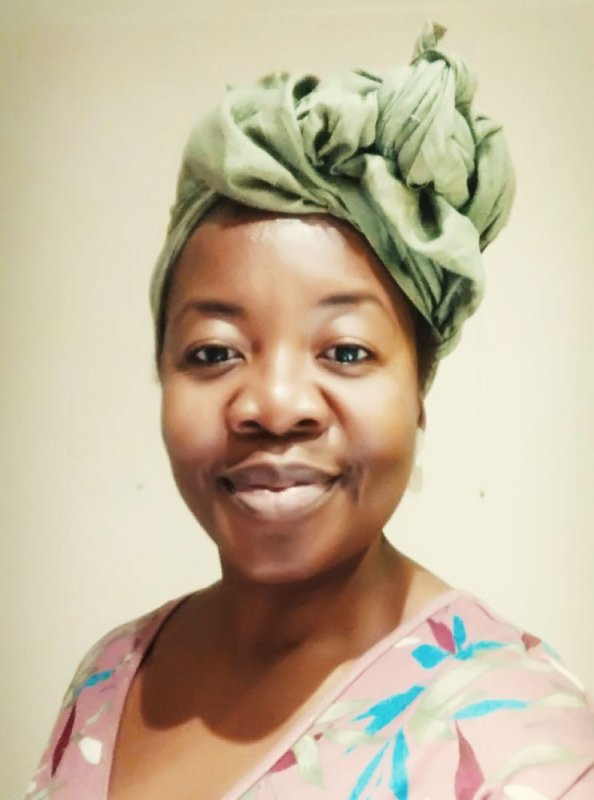
My family is my husband and my children, of course.
I got married 12 years ago, my partner is Spanish, we have 2 children.
One via adoption and the other through permanent foster care.
I had problems with my fertility caused by uterine fibroids and I lost my only pregnancy with 22 weeks. I had to give birth because my water broke, after the loss, I had an infection in the fallopian tubes, the infection was so powerful that it left my tubes useless. Then, they informed me that I could not be a biological mother without help and because we are Christians, we do not contemplate artificial insemination.
At the same time that we were trying for a second pregnancy without being aware of the misfortune of my tubes, we applied to become adoptive parents on the national adoption list in Madrid, where you could not choose the sex or the ethnicity of the prospective child, following the advice of friends, because they told us that list was made every 10 years. We were already clear about the idea of adopting if we could not have biological children.
We were assigned our son four years later in 2012, without much waiting.
National adoption in Spain is not well-known, much less in the Afro-descendant community.
In Africa there is also a taboo about not having children and what is considered family, must be blood related. I do not think that the possibility of adopting is contemplated at institutional level in Africa, neither do I believe that it is socially accepted; possibly for this reason the international adoption process is so successful in Africa. We were not candidates for international adoption because we did not have the financial means to do so.
During this waiting period, we worked a lot on what it means to adopt a child.
In my case, I never thought that being a Black woman could be a handicap,
in fact, they treated me like anybody else.
Efraín was given to us being just about 7 days old, we were overjoyed, he is today a smart and sensitive child. Being breastfed from the word go has helped enormously to create a bond with him.
Inducing breastfeeding in cases of adoption, is not well known but there are some cases with interviews in Italy and the United States.
What encouraged me the most was the protocol and how it was done.
It is about sending signals to the brain that someone is sucking the breasts and then the brain gives the order to produce milk, it is in short a hormonal response. I found information about the protocol developed by Dr. Jack Newman, which is an eminence in induction and with the whole subject of breastfeeding.
When it was about a year still awaiting my oldest son, I decided to start inducing with a breast pump, stimulating at high frequency, the breasts, as if I had a baby. I made some contacts in Barcelona through Alva Pardo, a very famous breastfeeding consultant, and she had taken some other cases and put me in touch with a couple of mums. They produced milk but it was not exclusive it was instead mixed breastfeeding.
You can also put the baby to the breast without the need for food, in this case by the exchange of oxytocin and endorphins these hormones, facilitate the bonding.
These newborn babies have so much stress that they need the suction to calm down, after childbirth, then we can imagine in cases of adopted babies who have suffered the shock of separating from their biological mother, at birth.
The trauma they suffer is called Primal Wound, a pattern of conduct linked with loss is established, and it will affect any type of connection based on affection that will mark these babies when creating bonds, with any person or with any situation, as well as their self-esteem, it makes them more vulnerable in general.
I have met some adults from the Diaspora, mothers who were adopted themselves, and they do have a bit of this trait.
Well, having this information, I had more reason to do an induction protocol, I could not avoid the wound but at least palliate its effects a little.
So, I focused myself on the induction process a year in advance without fear of the uncertainty of not knowing if the child would arrive, knowing that the benefit of breastfeeding was 15% of food and 85% of affective connection. So, I tried without expectations or pressures, enjoyed it, accompanied by a counsellor, going to groups and reading experts.
It was indeed, every hour and a half, going through half an hour session, almost did nothing else and it helped immensely not being at work at that time. I was going to bed quite late at night, because the highest prolactin peak is at two in the morning. I got lucky because after three or four weeks, I began to see the first drops, which motivated me to continue and everything followed through to the same rhythm of stimulation, what I took out in a 24 hours session, was enough and it became maintenance until the child could come and if he did not want to latch unto my chest, I would freeze the milk.
When I had no more space for more milk to be stored, my advisor offered the option to donate to the milk bank.
My case, took them by surprise because they had never heard of mother to be, through an induction by stimulation, without the use of medication and without a baby. They decided to analyse my milk from the first day, and they realized that
I produced standard milk for all kinds of premature babies.
They made a scientific protocol to study my case and it was published in a renowned internationally journal specialised in breastfeeding, orientated to the health field, I was invited as well to a national congress here in Spain, last year to talk about my experience with induction.
On a personal level, it was a very pleasant experience to be able to help other babies by donating my milk or this liquid gold as they call it.
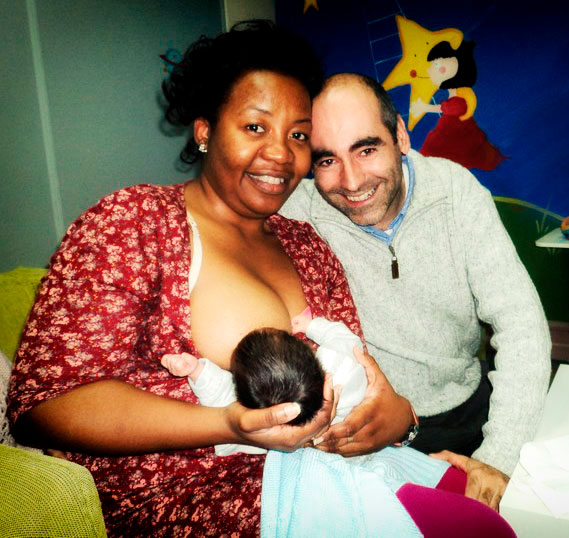
The biggest reward for me was, when I met my son crying, he was coming from 7 days in the hospital fed on bottles, I offered him my breast, and he got hooked right away, we were able to do exclusive breastfeeding.
We stayed mother and son at home for 3 years, establishing a strong bond,
it was something I wanted, we did co-sleeping, I was carried him everywhere as well.
We tried for a second adoption, between both our age and a possible child, we were told it would be a two-year-old, this time. We were then, offered the foster care option and in this case the child has contact with his biological family.
So, we decided to look for a long term option that way the children could become brothers.
Our second child was about a year or so, he had a serie of problems from birth, and he was coming from an emergency host family, who had him very well cared for, being treated from a very early age with psycho-stimulation. Today,
he no longer needs physio or therapy and sees his family one hour every month.
The two children have two very different characters and this is the most difficult for us to assume, the little one is more dependent and the experience is harder than with the older one, because of its difficulties.
The eldest has Latin features and the small one is very very White.
In short, we always breaking molds.
We also welcomed a nephew who was about 13 or 14 years old, he was with us for 6 years, then he went to Guinea, he has been another son, this foster care was like another kind of motherhood too.
I like the idea that my case can be a reference point for today’s youth, so that they can marry the person of their choice, regardless of ethnic or cultural differences, they may decide to have children or not. They understand that they can access the national adoption lists.
Being a member of some interracial associations, I was asked for my opinion about what’s best for the child in interracial adoptions, I have begun to think about the issue of interracial upbringing and I see the importance of having references as in my personal case, the Latin and Gypsy community have to play a part my children lives.
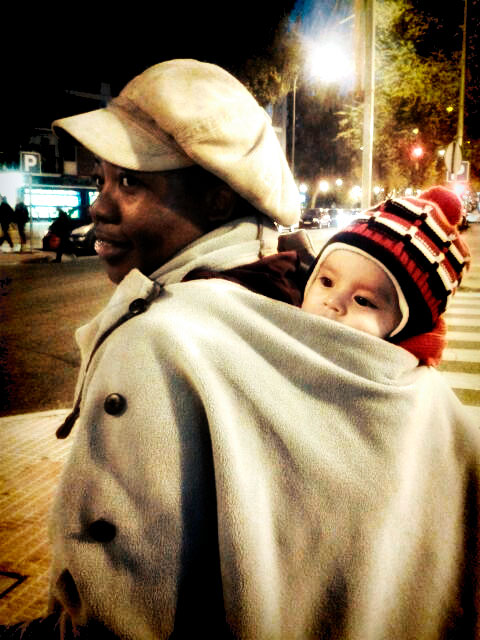
Spirituality is everything.
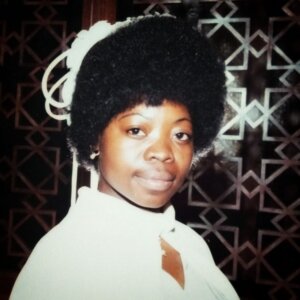 I’ll take the example of my parents who achieved success within their community, social and economic ascension to finally lose everything, and illness came, weakening them even more. My mother took refuge in the church which gave her the strength to fight, she told me :
I’ll take the example of my parents who achieved success within their community, social and economic ascension to finally lose everything, and illness came, weakening them even more. My mother took refuge in the church which gave her the strength to fight, she told me :
“I will not leave you money or a house but I will leave you faith.
It is what will guarantee you that you can do everything.”
According, to my point of view, she was right, I share my faith with my husband, it gives us the values in which we want to raise our children, and it helped us immensely to mature in this life.
Lately, my little one is making me laugh very much because he’s starting to talk, with the language of a 3-year-old, I literally laugh, with his expressions and formulations.
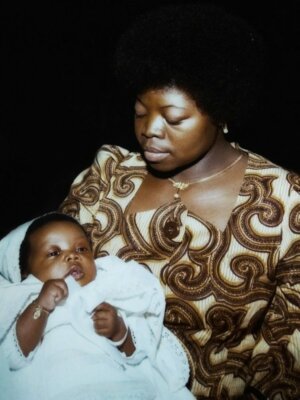 This blog came about as a result of a very big movement, an awakening in my generation to support the new generations of Afro-descendants in order to achieve more visibility. It’s about being the protagonist of our own stories which should not be told by others, the tale can be told singing, with poetry, with any medium as long as the protagonist is the person who can tell his own story, in this context it helped me a lot to create a blog.
This blog came about as a result of a very big movement, an awakening in my generation to support the new generations of Afro-descendants in order to achieve more visibility. It’s about being the protagonist of our own stories which should not be told by others, the tale can be told singing, with poetry, with any medium as long as the protagonist is the person who can tell his own story, in this context it helped me a lot to create a blog.
The name of the blog represents what I am “Afri from here Afri from there“.
Well, in this space, I am telling a little about my parents collection of memories, arriving to Spain, their life, what my uncles and the letters of the time are portraying from Guinean destinies.
It is a retrospective of another world through my family’s memories and it is an important task, a kind of legacy for my children.
Also, because this family legacy is being lost in our community, it is somehow the trunk of memories.
I’m also producing content on issues that touch me closely, that stir me up.
We talk about adoption issues, foster care, parenting, breastfeeding…
Photos
Afrika Ndongo
Some of Africa collaborations:
With the Seçiar Magazine.
Nném be queza
With the photographer Sara Martín Lopez
With the photographer Angelica Dass
With photographer Juan Valbuena
In another broader spectrum with talks and active participation in events, groups and associations such as:
– PrimaveraAfro
– Space ConscienceAfro
– Asociation IWEBEBE
– Karbù